Chemical Peels Explained: Types, Benefits and Risks
- services
- skincare-tips
Have you ever wished that attaining a healthy glow was as easy as shedding your skin? To some extent, it could be! At Charleston Dermatology, our board-certified dermatologists are always ready to help patients achieve the healthy skin of their dreams. While there are many paths to that fresh-faced feeling, chemical peels are among the most popular.
Chemical Peels Explained
A chemical peel is a safe, affordable and effective cosmetic treatment involving the application of a chemical solution to the skin to remove the outermost layers of dead cells. This process stimulates the growth of new skin cells and collagen, resulting in smoother, healthier-looking skin. Chemical peels can be used to treat a range of skin conditions, including acne, wrinkles, hyperpigmentation and sun damage.
Types of Chemical Peels
Chemical peels can be classified into three categories based on their depth of penetration: superficial, medium-depth and deep peels. The type and strength of the solution used will depend on the patient’s skin type and the specific condition being treated.
- Superficial Peels: Superficial peels are the mildest form of chemical peel and are typically made with alpha-hydroxy acids (AHAs) or beta-hydroxy acids (BHAs). These peels are ideal for treating mild acne, fine lines and uneven skin tone. They require little to no downtime and are safe for most skin types.
- Medium-Depth Peels: Medium-depth peels use trichloroacetic acid (TCA) or glycolic acid to penetrate deeper into the skin layers, making them ideal for treating moderate wrinkles, acne scars and pigmentation issues. Medium-depth peels require more downtime than superficial peels, and patients may experience swelling and peeling for up to a week following treatment.
- Deep Peels: Deep peels are the most intensive form of chemical peel and are typically used to treat severe sun damage, deep wrinkles and scars. Deep peels use phenol acid to penetrate deep into the skin layers, and patients may experience significant peeling, swelling and redness for up to two weeks after the procedure. Deep peels require the longest downtime – typically two to three weeks.
Superficial and medium-depth peel treatments may be repeated to maintain results. However, patients may only undergo deep peels once, according to the American Academy of Dermatology Association (AAD). Consult with your board-certified dermatologist to determine when it is safe for your follow-up procedure.
Benefits of Chemical Peels
It’s no accident that chemical peels are one of the most popular forms of skin care treatments in the dermatological world. This non-invasive, non-surgical procedure offers a wide variety of benefits for your skin. These benefits include the following:
- Improves skin texture: Chemical peels can help improve the texture of your skin by removing dead skin cells and promoting the growth of new skin cells. This can result in smoother, softer skin with a more even tone.
- Reduces signs of acne: Chemical peels can effectively reduce the appearance of acne by removing the top layer of skin that can trap bacteria and oils, causing breakouts.
- Reduces the appearance of fine lines and wrinkles: Chemical peels can stimulate collagen production, which can help reduce the appearance of fine lines and wrinkles.
- Evens skin tone: Chemical peels can help even out skin tone by reducing the appearance of hyperpigmentation and age spots.
As with all dermatological procedures, chemical peels may present risks, including sensitivity to the chemical solution, potential scarring and, in rare cases, permanent skin discoloration. However, these risks are mitigated when working with a trained and licensed board-certified dermatologist, such as those on our skincare team.
Charleston Dermatology peels away skincare worries!
Are you considering chemical peels? Let our board-certified skin care specialists help strip your worries away! With locations throughout the Lowcountry, Charleston Dermatology educates you on your skin, its unique needs, and how to attain healthy, happy, glowing skin. Schedule an appointment with one of our board-certified dermatologists today.
